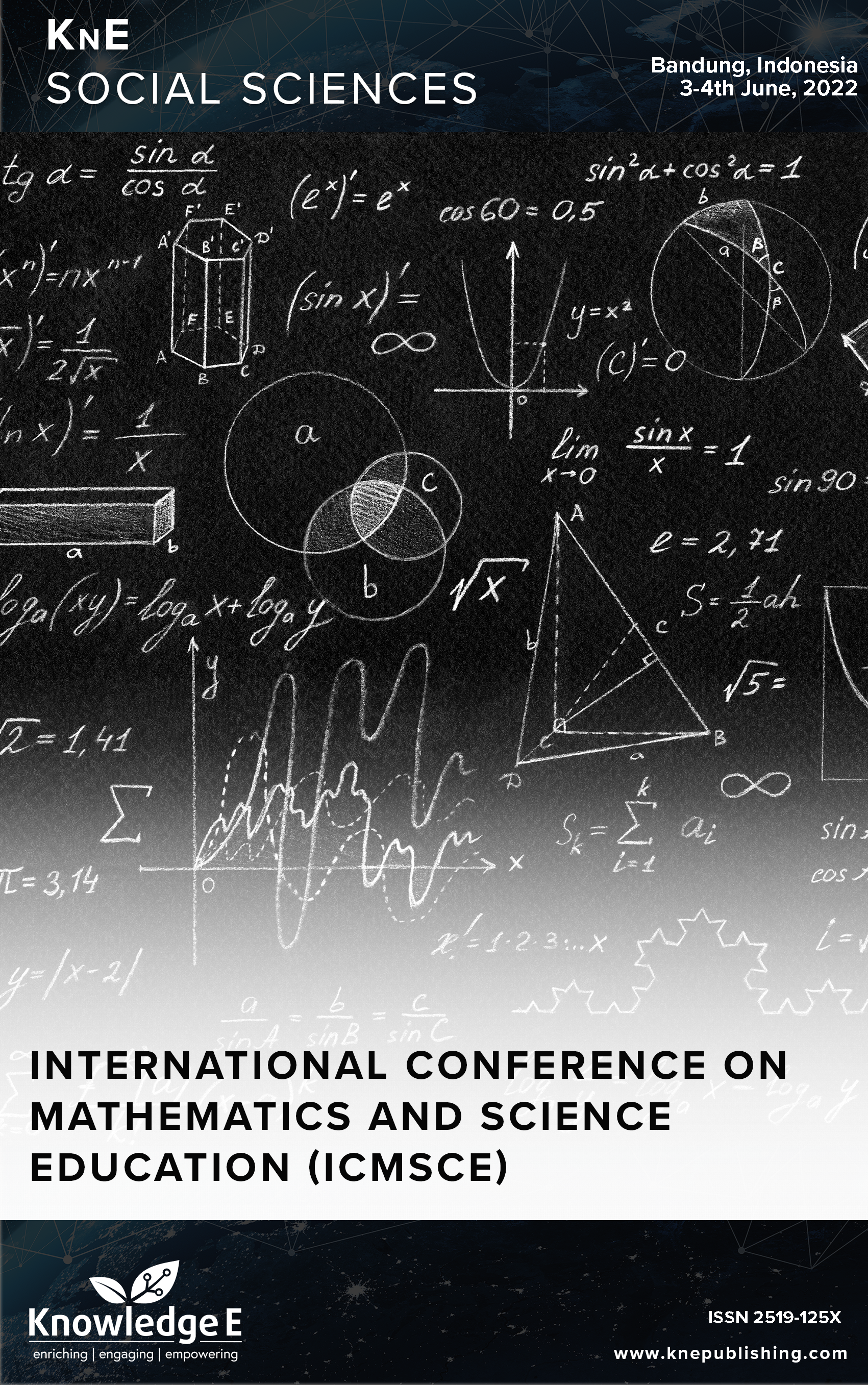Development of Electronic Worksheet Based on Problem-Based Learning in a Course on Acid-Bases to Develop Students' Problem-Solving Ability
DOI:
https://doi.org/10.18502/kss.v9i8.15504Abstract
This study aimed to analyze the characteristics and feasibility of electronic worksheets based on problem-based learning in the course on acid-base to develop student problem-solving abilities. This was a Research and Development (R & D) using a 4D modified model by Thiagarajan. The 4Ds were Define, Design, Develop, and Disseminate. Product validation was performed by experts. The product practicality test was performed by a reviewer and peer reviewer. Students performed the readability test. Instruments of data collection were product feasibility validation sheets, practicality test assessment sheets, and readability tests. Data analysis techniques were used to calculate the average score, which was categorized according to ideal assessment criteria. The results of the development research showed that an electronic worksheet based on problem-based learning was developed in the form of a website consisting of four learning activities with problem-based learning syntax adapted to the course on acid-base and an electronic worksheet based on problem-based learning in the course on acid-base was very feasible to be used. Based on validation from expert judgments, practicality test assessments from reviewers and peer reviewers, and readability tests by students, including the very good category, meaning that the electronic worksheet is very feasible for learning activities. Therefore, electronic worksheets based on problem-based learning were suitable for chemistry courses on acid-bases to develop problem-solving abilities.
Keywords: electronic worksheets, problem-based learning, acid-base, problem-solving
References
Abidah A, Hidaayatullaah HN, Simamora RM, Fehabutar D, Mutakinati L, Suprapto N. The impact of covid-19 to Indonesian education and its relation to the philosophy of ‘merdeka belajar,’. Studies in Philosophy of Science and Education. 2020;1(1):38–49. DOI: https://doi.org/10.46627/sipose.v1i1.9
Syafitri RA. The importance of the student worksheets of electronic (E-LKPD) contextual teaching and learning (CTL) in learning to write description text during pandemic COVID-19. The 3rd International Conference on Language, Literature, and Education; 2020. Atlantis Press; 2020. https://doi.org/10.2991/assehr.k.201109.048. DOI: https://doi.org/10.2991/assehr.k.201109.048
Anazifa RD, Djukri D. Project-based learning and problem-based learning: are they effective to improve student’s thinking skills? Jurnal Pendidikan IPA Indonesia. 2017;6(2):346–55. DOI: https://doi.org/10.15294/jpii.v6i2.11100
Irwanto S, Saputro AD, Rohaeti E, Prodjosantoso AK. Promoting critical thinking and problem solving skills of pre-service elementary teachers through Process-Oriented Guided-Inquiry Learning (POGIL). Int J Instr. 2018;11(4):777–94. DOI: https://doi.org/10.12973/iji.2018.11449a
Hidayat T, Susilaningsih E, Kurniawan C. The effectiveness of enrichment test instruments design to measure students’ creative thinking skills and problem-solving. Think Skills Creativity. 2018;29:161–9. DOI: https://doi.org/10.1016/j.tsc.2018.02.011
Arif A, Istyadji M, Syahmani S. Implementasi problem based learning berbantuan diskusi daring terhadap kemampuan pemecahan masalah dan hasil belajar kimia pada materi larutan penyangga [ Journal of Chemistry And Education]. JCAE. 2018;1(3):237–44.
Valdez JE, Bungihan ME. Problem-based learning approach enhances the problem solving skills in chemistry of high school students. JOTSE. 2019;9(3):282–94. DOI: https://doi.org/10.3926/jotse.631
Shultz GV, Li Y. Student development of information literacy skills during problembased organic chemistry laboratory experiments. J Chem Educ. 2016;93(3):413–22. DOI: https://doi.org/10.1021/acs.jchemed.5b00523
Alrahlah A. How effective the problem-based learning (PBL) in dental education. A critical review. Saudi Dent J. 2016 Oct;28(4):155–61. DOI: https://doi.org/10.1016/j.sdentj.2016.08.003
Aidoo B, Boateng SK, Kissi PS, Ofori I. Effect of problem-based learning on students’ achievement in chemistry. J Educ Pract. 2016;7(33):103–8.
Hidayah AN, Winingsih PH, Amalia AF, Fisika D. Development of physics e- LKPD (electronic worksheets) using 3d pageflip based on problem based learning on balancing and rotation dynamics. Jurnal Ilmiah Pendidikan Fisika-COMPTON. 2020;7(2):36–43. DOI: https://doi.org/10.30738/cjipf.v7i2.9091
Lailiah I, Wardani S, Sudarmin S, Sutanto E. Implementasi guided inquiry berbantuan e-LKPD terhadap hasil belajar kognitif siswa pada materi redoks dan tata nama senyawa kimia. Jurnal Inovasi Pendidikan Kimia. 2021;15(1):2792–801.
Zuhroti B, Marfu’ah S, Ibnu MS. Identifikasi pemahaman konsep tingkat representasi makroskopik, mikrokopik dan simbolik siswa pada materi asam-basa [ Jurnal Pembelajaran Kimia]. J-PEK. 2018;3(2):44–9. DOI: https://doi.org/10.17977/um026v3i22018p044
Thiagarajan S. “Instructional development for training teachers of exceptional children: a sourcebook.,” p. 1974.
Sya’idah FA, Wijayati N, Nuswowati M, Haryani S. Pengaruh model blended learning berbantuan e-LKPD materi hidrolisis garam terhadap hasil belajar peserta didik. Chem Educ. 2020;9(1):76–83.
Yuriev E, Naidu S, Schembri LS, Short JL. Scaffolding the development of problemsolving skills in chemistry: guiding novice students out of dead ends and false starts. Chem Educ Res Pract. 2017;18(3):486–504. DOI: https://doi.org/10.1039/C7RP00009J
Günter T, Alpat SK. The effects of Problem-Based Learning (PBL) on the academic achievement of students studying ‘electrochemistry,’. Chem Educ Res Pract. 2017;18(1):78–98. DOI: https://doi.org/10.1039/C6RP00176A
Sukorini P, Purnomo T. Kelayakan dan kepraktisan lembar kegiatan peserta didik (LKPD) berbasis problem based learning (PBL) untuk melatihkan keterampilan penyelesaian masalah pada submateri daur ulang limbah peserta didik kelas X SMA. Berkala Ilmiah Pendidikan Biologi. 2019;8(1).

